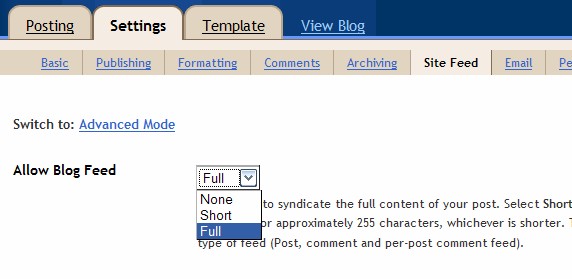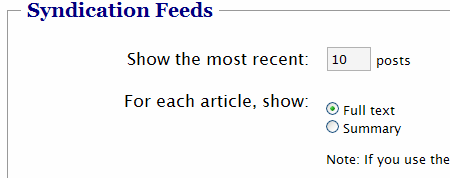Table of contents for Mom Blogging Advice
RSS is an important acronym in the blogosphere. It’s usually interpreted as Really Simple Syndication, so we’ll start with the really simple and work our way up. I think we have something for even the most seasoned blogger here.
Basic
First, an excellent explanation of the easiest way to keep up with dozens (hundreds!) of blogs from Common Craft:
Also under “basics,” your blog generates an RSS feed automatically (unless you’ve disabled this feature).
Novice
FeedBurner “burns” your blog feed for you, making it easy for your readers to subscribe in any feed reader. If you click on the green “Subscribe” button in the sidebar, you’ll be taken to a page to choose your feed reader.
FeedBurner can also add a lot of cool features to your feed. You can add information at the end of messages in a feed reader like copyrights, number of comments, social bookmarking stuff—there are more than 100 “FeedFlares.” FeedBurner can also track visitors to your site and show you how many subscribers you have.
Intermediate
Many people use only partial feeds for their sites, sending only excerpts or summaries to their readers. There are a few reasons for this; among them is the legitimate concern about unscrupulous people republishing your blog with zero effort—and making money off your hard wraught writing.
However, the benefits of full feeds outweigh the risks. [UPDATE: the full story on full feeds] Also note that many people publish excerpt feeds believing that more people will visit their site to read their full posts—but FeedBurner CEO Rick Klau says they’ve seen no evidence to support that. See Partial Feeds Don’t Draw Visitors at Marketing Pilgrim for more on the subject.
In Blogger, you can switch from excerpts to full feeds by going to Settings > Site Feed. From the pull down menu, select “Full.” (If you’re in Advanced Mode, the second and third options are at your discretion.)
In WordPress, select Options > Reading.
Under “Syndication Feeds,” for the option “For each article, show,” select “Full text.”
See Semantically driven for details on how to switch to full feeds in TypePad.
Advanced
Make sure your readers find your FeedBurner feed (instead of the default, less user-friendly feed Blogger, WordPress or Typepad creates). You may have to code it into your site. For example, in Blogger, go to Template > Edit HTML. In your code, find the line:
<b:include data=’blog’ name=’all-head-content’/>
Delete it and replace it with the following (after you’ve customized it):
<meta content=’text/html; charset=UTF-8′ http-equiv=’Content-Type’/>
<meta content=’true’ name=’MSSmartTagsPreventParsing’/>
<meta content=’blogger’ name=’generator’/>
<link href=’http://feeds.feedburner.com/YOUR FEEDBURNER FEED NAME HERE’ rel=’alternate’ title=’YOUR BLOG NAME HERE RSS Feed’ type=’application/rss+xml’/>
Blogger now offers integration with FeedBurner. Here are the instructions on integrating your FeedBurner feed with your Blogger blog. TypePad also features this capability.
WordPress has a handy FeedBurner feed replacement plugin to do that heavy coding for you.
Total pro
If you’re comfortable in Apache, consider Daniel’s strategy for making sure that your subscribers are using the correct feed even if you leave FeedBurner (from Daily Blog Tips). (To tell the truth, I can only vaguely understand this one.)
Also, look at another post from Marketing Pilgrim (and no, this one’s not by me, it’s by Jeremy Luebke) on why you should not use click tracking on FeedBurner (read on the comments to see how to fix that).
Anybody out there quite proficient in MT/Typepad? I started on Blogger and had to learn WordPress for work before I made the switch to WordPress here on MamaBlogga. If anyone can give some pointers on the same issues on TypePad, it would be appreciated!
UPDATE: A big thank you to Jen once again at Semantically driven for explaining how to set your feed to full posts on Typepad. She had got screenshots and everything. Man, I should’ve thought of that. I’ll have to fix this. Screenshots added. Thank you, Jen!!






